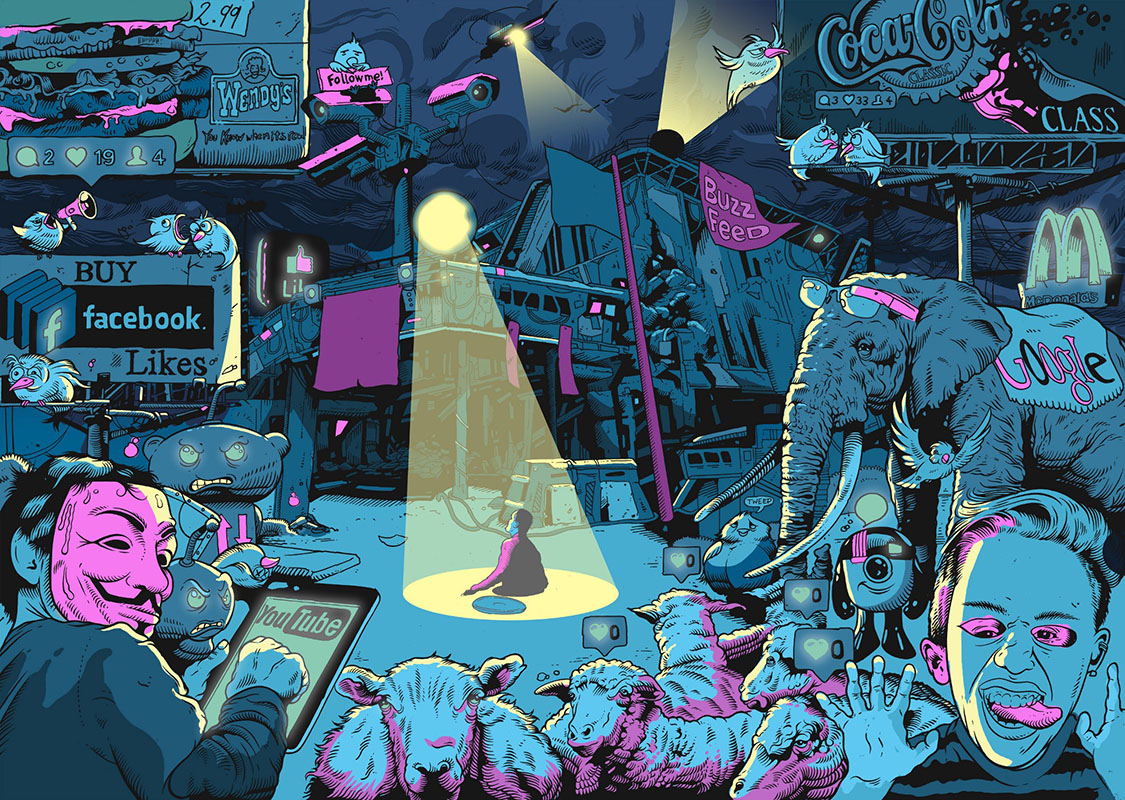Things tagged bestof:
A Swedish Ad Campaign, for Kalles Kaviar, Tests the World’s Gag Reflex
Cecilia Sajland, marketing manager for Kalles, said, “We wanted to show other nationalities’ incomprehension when it comes to very Swedish tastes like Kalles,” adding, “We wanted Swedes to feel unique and proud of the brand and the taste.”
The Web We Have to Save
Seven months ago, I sat down at the small table in the kitchen of my 1960s apartment, nestled on the top floor of a building in a vibrant central neighbourhood of Tehran, and I did something I had done thousands of times previously. I opened my laptop and posted to my new blog. This, though, was the first time in six years. And it nearly broke my heart.
You should really read that, powerful stuff.
For me, I feel like the solution is a re-emergence of the cultural elite on the web, as it was to a large degree in the late 90’s early 00’s. Then it was the whole web that was the elite, by definition. Now it will be self selected group(s), rejecting the draw of commercialism, and mass appeal, and returning to a smaller community of people who care about discourse. The good news is that this community will no longer be elite by virtue of privilege, but by choice and self selection. Bloggers who whine that only 800 people read their blog on the web, but get 40k impressions on FB? Ok, you are making a choice. People who chose to write to the 800 readers are joining a different community.
The Really Big One
Fantastic science writing, don’t miss this.
Kathryn Schulz in The New Yorker:
In the end, the magnitude-9.0 Tohoku earthquake and subsequent tsunami killed more than eighteen thousand people, devastated northeast Japan, triggered the meltdown at the Fukushima power plant, and cost an estimated two hundred and twenty billion dollars. The shaking earlier in the week turned out to be the foreshocks of the largest earthquake in the nation’s recorded history. But for Chris Goldfinger, a paleoseismologist at Oregon State University and one of the world’s leading experts on a little-known fault line, the main quake was itself a kind of foreshock: a preview of another earthquake still to come.
The Exit Interview: I Spent 12 Years in the Blue Man Group
Eric Grundhauser at Atlas Obscura:
Blue Man Group is a theatrical performance that defies easy categorization—part drumming, part acting, part Tobias Fünke—known for an audition process that competes with Manhattan preschools for difficulty of acceptance. But what’s it like to be behind all that blue paint? We spoke to a recently-retired Blue Man named Isaac Eddy. For over 12 years, Eddy lived and performed behind the thick blue veneer and anonymous black garb of the Blue Men. From Las Vegas to New York to London, Eddy portrayed one of the wordless azure elementals first developed by performance artists Chris Wink, Matt Goldman, and Phil Stanton in 1991.
In our conversation with Eddy, we found that he was far from silent about his experience as a Blue Man. From the struggles of learning drumming for the audition, to how the behavior of dogs informed his performance, to his portentous final show, Eddy let us in on just about every aspect of his time under the Blue, and why he decided to be a human again.
Bitter Lake
Adam Curtis’s beautiful, gripping film unravels a story of violence, bloodshed and bitter ironies. Beginning with a fateful meeting between President Roosevelt and King Abdulaziz of Saudi Arabia, Curtis delves into a mass of historical archives to shed light on Afghanistan and the west.
The film was quite something. When I heard it was “found footage” I thought it was going to be something else. I still wish it had been that, but what it is still amazing. Definitely worth watching.
The Last Day of Her Life
Robin Marantz Henig in The New York Times:
When Sandy Bem found out she had Alzheimer’s, she resolved that before the disease stole her mind, she would kill herself. The question was, when?
Surely you can’t be serious: An oral history of Airplane!
We spoke with as many people involved in Airplane! as we possibly could—including the Zuckers, Jim Abrahams, and cast members Robert Hays, Frank Ashmore, Al White, Lee Bryant, Ross Harris, Jill Whelan, Maureen McGovern, David Leisure, Gregory Itzin, Marcy Goldman, and Jimmie Walker—and asked them to reflect on their experiences while making the film as well as their astonishment that audiences still love Airplane!
Teenagers Face Early Death, on Their Terms
Jan Hoffman in The New York Times:
Until recently, most clinical teams believed that adolescents would not understand the implications of end-of-life planning and that they might be psychologically harmed by such talk.
Sometimes when providers do make the attempt, parents or patients may abruptly change the subject, fearful that by joining in, they are signaling that they have abandoned hope.
Yet research shows that avoiding these talks exacerbates the teenage patient’s fear and sense of isolation. In a 2012 survey examining end-of-life attitudes among adolescent patients with H.I.V., 56 percent said that not being able to discuss their preferences was “a fate worse than death.”
Man Finds Needle In Haystack
Two things; no this is not an Onion link. And how great is it that there is a news outlet called “modern farmer”, that reports on wonderful things like this?
Artist Sven Sachsalber has accomplished much in his career as a conceptual artist, from surviving a performance in which he ate poisonous mushrooms to spending 24 hours with a cow. But his latest is a non-metaphoric metaphoric triumph: he has found a needle in a haystack.
David Fincher - And the Other Way is Wrong
Tony Zhou Every Frame a Painting:
For sheer directorial craft, there are few people working today who can match David Fincher. And yet he describes his own process as “not what I do, but what I don’t do.” Join me today in answering the question: What does David Fincher not do?
Van Jacobson speaks on Content Centric Networking
Nerd out time. Gets really good towards end of part 3.
The Named Data Networking (NDN) project makes use of the CCN (Content-Centric Networking) architecture developed at the Palo Alto Research Center (PARC). In this presentation, Van Jacobson speaks on content-centric networking at the Future Internet Summer School (FISS 09) in Bremen, Germany in June 2009.
What Should Medicine Do When It Can’t Save You?
There are two things I care passionately about, and believe american culture (western culture generally) have wrong; education, and death. Here is a great piece on the latter. This is not something we can fix through legislation. (see: Death councils). It will have to be a cultural shift.
Atul Gawande in The New Yorker:
A few days before Thanksgiving, she had another CT scan, which showed that the pemetrexed—her third drug regimen—wasn’t working, either. The lung cancer had spread: from the left chest to the right; to the liver; to the lining of her abdomen; and to her spine. Time was running out.
This is the moment in Sara’s story that poses a fundamental question for everyone living in the era of modern medicine: What do we want Sara and her doctors to do now? Or, to put it another way, if you were the one who had metastatic cancer—or, for that matter, a similarly advanced case of emphysema or congestive heart failure—what would you want your doctors to do?
The issue has become pressing, in recent years, for reasons of expense. The soaring cost of health care is the greatest threat to the country’s long-term solvency, and the terminally ill account for a lot of it. Twenty-five per cent of all Medicare spending is for the five per cent of patients who are in their final year of life, and most of that money goes for care in their last couple of months which is of little apparent benefit.
And the hour long documentry on Frontline is here. Trailer for that:
Eric X. Li: A tale of two political systems
It’s a standard assumption in the West: As a society progresses, it eventually becomes a capitalist, multi-party democracy. Right? Eric X. Li, a Chinese investor and political scientist, begs to differ. In this provocative, boundary-pushing talk, he asks his audience to consider that there’s more than one way to run a succesful modern nation.
Biophilia: Continuing Human Evolution: Fallacies and Prospects
Where are we going, and where do we want to go, genetically speaking?
Of all the politically correct stances, the genetic unimprovability of humanity is perhaps the most inviolable. Even while we work daily, even feverishly, to improve other aspects of our material and cultural existence, our biology remains an ethical red zone, where nothing can be done and no infringement placed on individual replication. As a response to the abuse of eugenics in the 20th century, and to the deep philosophical problems involved, this is understandable. But it does not do justice to the underlying science.
Eugenics are a real issue, have been a real issue, and will continue to be a real issue. Genetic modification techniques will come to be applied on humans, and the rich will get it first. Looking away from these realities because they are uncomfortable is weakness.
Walking City
Winner of Golden Nica at Ars Electronica 2014
Referencing the utopian visions of 1960’s architecture practice Archigram, Walking City is a slowly evolving video sculpture. The language of materials and patterns seen in radical architecture transform as the nomadic city walks endlessly, adapting to the environments she encounters.


